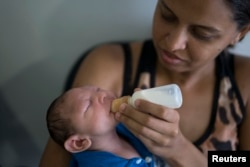Brazilian health officials said Friday that they had found live samples of the Zika virus in saliva and urine samples.
Paulo Gadelha, president of the Oswaldo Cruz Foundation, a biomedical research institution in Rio de Janeiro, said at a news conference that casual kissing "increases the risk" of being infected with the virus. He said, however, that there should be no anti-kissing policy.
Scientists at research institution said they were trying to determine whether body fluids could spread Zika to new patients.
Brazil entered the Carnival season Friday, a time when people commonly kiss strangers they meet at massive street parties.
Meanwhile, the World Health Organization advised officials not to accept blood donations from people who recently returned from countries affected by the Zika virus.
The mosquito-borne virus is most prevalent in Latin America, particularly Brazil, and poses its greatest danger to pregnant women.
"With the risk of incidence of new infections of Zika virus in many countries ... it is estimated as an appropriate precautionary measure to defer donors who return from areas with Zika virus outbreaks," the WHO told the French news agency AFP on Thursday.
Microcephaly
Doctors suspect the Zika virus is linked to a rare neurological condition called microcephaly, which causes babies to be born with abnormally small heads.
Brazil reports more than 4,000 microcephaly cases since October. But experts are puzzled about why it is nearly nonexistent in other Latin American countries where the Zika virus is present.
Spain confirmed the virus Thursday in a pregnant woman who had recently traveled to Colombia. It was the first known pregnancy-related Zika case in Europe.
There is currently no treatment for Zika. But a number of global pharmaceutical houses are rapidly working on a vaccine.
Brazil's President Dilma Rousseff said Thursday that Brazil and the United States were working together to develop a vaccine for the Zika virus, but warned it might take some time.
Panama research
Meanwhile, officials in Panama said they were focusing their fight against Zika on the mosquito that carries the virus.
Experts told AFP they were looking at releasing millions of genetically modified male Aedes mosquitoes, who would mate with the females and result in offspring that die at the larval stage.
Panama carried out such an experiment near Panama City in 2014, nearly wiping out a town's entire mosquito population.
Tonga confirms 5 cases
In another development Friday, the tiny South Pacific kingdom of Tonga reported it had five confirmed cases of Zika and more than 250 other people suspected of having the virus. Tongan officials began spraying for mosquitoes in schools and other places where people gather.
WATCH: Dr. Anthony Fauci on unlikeliness of Zika outbreak in US









